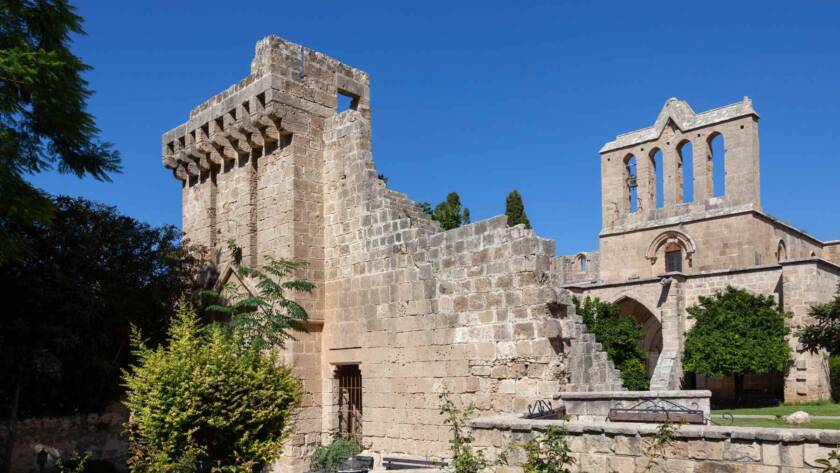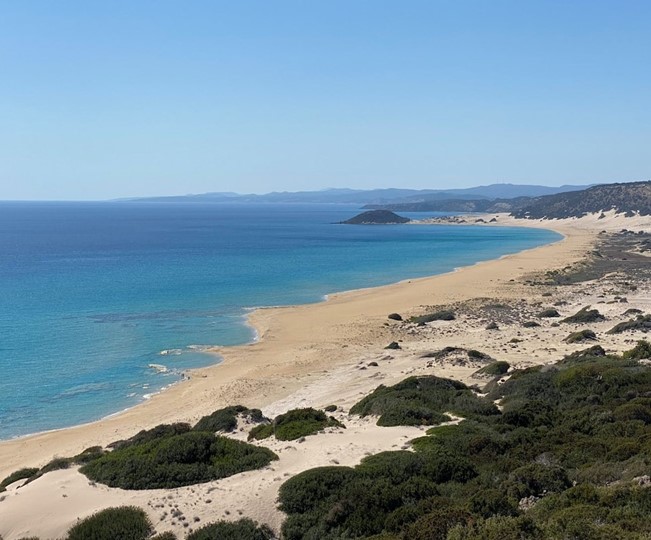QThe officially recognized name of North Cyprus (Kuzey Kibris) is TRNC or the Turkish Republic of Northern Cyprus – all are used interchangeably. Kibris (ky-briz) is the Turkish word for Cyprus. The population on the island is just under 300 000 (the last official census in 2011), however current estimations calculate above 500 000, with the capital Nicosia the most densely populated city.
North Cyprus is in the Eastern European Time Zone and Standard Time is +2 hours ahead of Greenwich Mean Time.
Climate & Weather
The healthy Mediterranean climate that blesses North Cyprus allows for an all-year assortment of rewarding and pleasurable leisure activities.
Long sunny Summer days across hot yellow sands complimented with the refreshing plunge into the clear blue waters of the Mediterranean. It is well advised to seek some beach-side shade in this season as temperatures easily exceed 40°C at its peak.
The weather in the Spring and Autumn while not as scorching hot is still warm but in the balmy evenings you may need to throw a jacket over your day-time T-Shirt. This seasonal relief from the high summer sun also opens up a plethora of possibilities – activities such as cycling, hiking, nature watching and a range of land and water sports including golf, tennis, water skiing and snorkeling all await the enthusiast, or indeed the beginner.
Whilst the locals cool down in the sea from June – September, most Westerner’s from much harsher climes are known to dip into the East Med from April onwards all the way through to the end of November.
Even paradise must experience a Winter, but North Cyprus’s is still pleasantly mild, averaging 10°Cin the coldest month of January.

Language & Religion
The official and predominant language in North Cyprus is Turkish. The Turkish Cypriots have a regional dialect that differs from that spoken in Turkey, though the basic language is the same and there are rarely communication difficulties between the two. English is widely spoken and understood with many Cypriots having lived in the UK or with relatives residing there – the language is also taught in Cypriot schools. Russian, German and Greek languages are also common languages around the island.
A large majority of the Turkish-Cypriot population is considered Sunni Muslim. Most non-Muslims are expats or overseas labor from Europe, including members of the Roman Catholic Church, Anglican Church, Greek Orthodox Church and the Jewish Community.
Whilst the Muslim community attend religious services at mosques located in almost every village, other houses of worship namely churches, chapels and synagogues are scattered across North Cyprus.
Money & Currency
The country’s official currency is the Turkish Lira, the symbol for which is abbreviated as ₺ or TL.
Most businesses do accept payments in English Sterling, Euro and US Dollars, and there are many Bureau de Exchanges offering competitive rates all over the country.
The Turkish Lira is relatively weak against most foreign currencies, another reason why visitors prefer North Cyprus as an attractive holiday destination, with a full course evening meal costing not more than 35 Euro’s at most restaurants, beverages included.
Health
All visitors are entitled to free emergency medical treatment at state hospitals, and all blood banks have been HIV screened – most doctors can converse in English. Global health insurance policies are also covered in the many private hospitals and clinics located in urban areas.
If you stay on the island for at least 6 months a year, you will need to purchase either Private Emergency Cover or State Health Insurance as part of the Residency process.
Ezcane’s or chemist shops, which are signed with a large red colored “E” can recommend medicines for common illnesses, and many drugs such as antibiotics are available cheaply over the counter, with no need for prescriptions. Almost all brands of manufactured European brands can be found. After normal working hours, a few chemists will remain open on rotation until past midnight 7 days a week, the relevant information available on all shop windows.
In case of health emergencies, dialing 112 will direct you to the relevant emergency services.
Taxis
Renowned for only driving luxury vehicle models, vacant taxi drivers are almost always stationed at their bays and are not likely to be stopped roadside.
All hotels will have a designated taxi partner readily on call, and in most town centers travelers will pass by a near taxi bay.
Taxis are metered and charge per kilometer distance travelled, rates do change between daytime and night.
When travelling between towns, on mid to long distance journeys, most drivers will be able to quote a fixed price beforehand, and if you really feel to get local, why not try bargaining the fee before you get in.
Transportation
As an island situated in the Mediterranean, the main means of travel to NCY is via air, although transportation from Turkey by sea is also an option.
You will be issued with a 30 days tourist visa when you arrive, although this can be increased up to 90 days if you can show proof of accommodation (hotel booking etc.). If you want to live or spend more than 6 months a year on the island then you must apply for a temporary residents permit.
Air Travel
North Cyprus´Ercan Airport (ECN), located near the capital Nicosia, currently serves over 4 million passengers annually.
Many Tour Operators offer transfers a door to door services for visitors booked through them. South Cyprus´ Larnaca Airport (LCA), located in Larnaca. Many Tour Operators offer transfers a door to door services for visitors booked through them.
Public Transport
Not the most advanced service or infrastructure, small minibuses also known as “Dolmuş” (dol- moush) pick up passengers’ roadside and transport over short distances connecting main towns to villages. Very frequent in most towns as well as cheap to commute with, there is no regulated schedule nor do they stray off any main roads, an important consideration when planning for your visit.
Sea Travel
If you are considering crossing the Mediterranean by sea, daily ferry services operate from Famagusta and Kyrenia harbors to the Mersin province in the southern coast of Turkey and final plans are under way for services connecting Alanya near to Antalya, with North Cyprus. Depending on the type of ferry available, the shortest duration from Kyrenia to Mersin Taşucu is 2.5 hours.
Pedestrians
Pedestrians are also reminded that traffic moves on the left side of the road and are advised to look both right and left carefully before crossing any road. If on any side streets or rural areas where pavements are not available, pedestrians should walk on the right side towards any oncoming traffic.
Tipping
Tipping is not a huge deal in North Cyprus, though it is expected for certain services, for example, waiters, hotel staff and tour guides.
In some restaurants a service charge may be included, if not a 10% tip is usually appreciated.
Car Rental
Global and local vehicle hire operators are stationed throughout the island, with those running at Ercan offering the option to pick up and drop off your vehicle at the airport.
Car hire prices differ, based on season, brand, passenger capacity and length of hire, however the average daily price of a 5-seater vehicle will cost between £20 – £25 in the summer, with no additional hidden costs. Read further below for NCY driving rules & regulations.
Driving Regulation
Unlike most European countries, traffic in North Cyprus uses the left-hand side of the road and driving regulations are similar to that of the United Kingdom. Short-term visitors and tourists can drive non-commercial vehicles using most global driving licenses, including EU and UK.
You may be fined if you drive without a seat belt and heavier fines also apply if you use a mobile telephone or are under the influence of alcohol while driving. When hiring a vehicle, check that it is roadworthy and that you have appropriate insurance cover and safety equipment.
In general vehicles hired in the NCY are not insured for use in South Cyprus, therefore it is advised to check with your insurance company first – you will not be allowed through a crossing without the correct insurance documents. At some of the crossing points it is possible to buy car insurance for driving on either side of the island.
Safety
NCY is also reputably a safe and friendly island, with a very low-level violent crime rate. There is no harassment of lone females and as a tourist destination it is untainted by the sort of expectations raised by the behavior of some visitors to other parts of the Mediterranean.
The National Police Force are stationed in all major towns
and can be reached on 155 in emergency situations.
Should you inadvertently stray into a military area, you will be politely escorted out and redirected – notices stating ‘No Photography’ should always be taken seriously, as should the reduced speed limits in force if driving past them.

